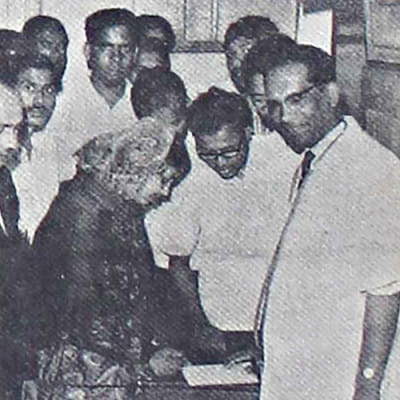‘Can Pakistan be saved?’

March 4, 1971
AL ASSUMING THE ROLE OF A DE FACTO GOVERNMENT
In a statement issued on March 4, 1971, Bangabandhu Sheikh Mujibur Rahman asked government and non-government offices where employees had not yet been paid their salaries, to function between 2:30 pm and 4:30pm for the purposes of disbursing salaries during the next two days of hartal. The banks should also function during these hours for cash transaction within "Bangladesh" only in respect of salary cheques not exceeding 1,500 rupees. No remittances should be effected outside "Bangladesh", he added.
Issuing these directives, according to Kamal Hossain, was the first step towards the Awami League assuming the functions of a de facto government in the eastern wing. He refers to the timing of transaction, as an example, which was deliberately limited from 2:30pm to 4:30pm, rather than in the morning, to show that offices and banks were not operating as per normal but according to the directives issued by the Awami League. [Kamal Hossain, Bangladesh Quest for Freedom and Justice, UPL 2013, pg. 86]
Three days into the non-cooperation movement, a countrywide hartal was observed. Six people were killed in Khulna in the face of army attack. In Chattogram the death toll rose to 121 in two days.
'CAN PAKISTAN BE SAVED?'
On the night of March 4, 1971, Major General Rao Farman Ali, then military adviser to the governor of East Pakistan, visited Bangabandhu at his Dhanmondi residence and asked, "Can Pakistan be saved?" Sheikh Mujib replied in the affirmative and said, "It can be saved if somebody listens to us. So many people are being killed by the army. They listen to [Zulfikar Ali] Bhutto. They don't listen to me." [ Rao Farman Ali, How Pakistan Got Divided, OUP 2017]
Bangabandhu added that first of all there should be no opposition to the Six Points. Referring to their private talks in January 1971, Bangabandhu said Bhutto had not opposed any of the provisions of the Six Points but had been interested only in cabinet positions for his party members and in the presidency for himself. He also demanded abrogation of martial law and transfer of power.
Tajuddin Ahmad joined the conversation at this juncture and emphasised two separate constituent assemblies, one for the east and one for the west, preparing constitutional drafts and then meeting as one to complete the final document as the only solution to the crisis. He also indicated that AL representatives could not sit in the same room with Bhutto after his unilateral veto to the convening of the National Assembly. [Richard Sisson and Leo E Rose, War and Secession: Pakistan, India, and the Creation of Bangladesh, UCP, 1990, pg. 98]
RADIO PAKISTAN CHANGED TO DHAKA BETAR KENDRO
The state-run Radio Pakistan in Dhaka started broadcasting as Dhaka Betar Kendra. The station not only broadcasted all directives issued by the Awami League, but also played the patriotic tunes of Rabindranath Tagore and rebel poet Kazi Nazrul Islam. A group of radio artists announced that as long as conspiracy against democracy continues, they will not perform for Radio Pakistan.
Shamsuddoza Sajen is a journalist and researcher. He can be contacted at [email protected]

 For all latest news, follow The Daily Star's Google News channel.
For all latest news, follow The Daily Star's Google News channel. 




Comments